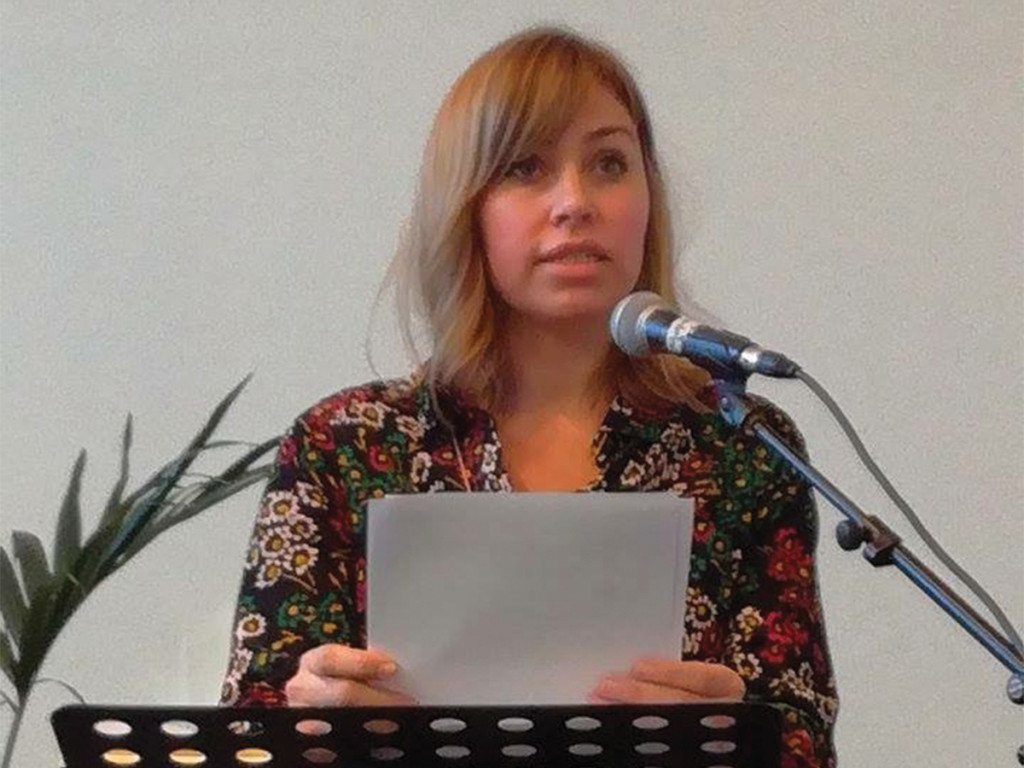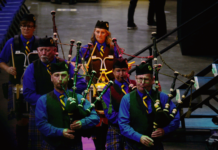
Professor Ford performing a lecture on poetry at the Oslo Literary Festival titled “Country of Violence.”
Aside from being a professor of creative writing at UC Riverside, Katie Ford is an American poet who has published a wide array of poems and volumes of poetry including “Storm” (2007) and “Colosseum” (2008) . Her work has been showcased in various prestigious outlets including The New Yorker and The Paris Review, and she recently served as one of the judges in the 2016 National Book Award in Poetry. Before publishing work relating to subjects such as Christian belief and natural disaster, just to name a few, she studied English at Whitman College and earned her Master’s degree in Divinity from Harvard University. Here are a few words she has to say about following one’s passion in the humanities field, encountering literary controversy and seeking guidance from professors.
Jasmine: When did you begin seriously writing, such as when did you first decide definitively that you wanted to make a career out of writing?
Professor Ford: I enrolled in a creative writing course when I was a sophomore at Whitman College, and all I knew at that moment was that I wanted to make poems. I wanted to create beautiful things. I have a specific memory of experiencing the beauty of language, which doesn’t mean the language has to be lovely or “pretty” (on the contrary, beauty can be terse and sharp), and wanting to do my best to create such beauty.
Jasmine: In your book titled, “Colosseum,” you explore the themes of destruction and natural disaster stemming from your personal experience living in New Orleans at the time of Hurricane Katrina. Would you say that writing this book was a result of the desire to cope with the distress or was there some other purpose?
Professor Ford: Writing about the flood and dead citizens of New Orleans was not a coping mechanism. It was simply the reality of my physical and spiritual surroundings, and the extremity created an entirely new world — one that compelled many artists into acts of description and elegiac art that, I hope, sealed that atrocious moment into new creations that remember the dead and the suffering, most of whom were the black poor. Sometimes such creative acts make the author feel worse, as what comes out during the writing might be revelations about the disaster of our government. Its purpose is not about “feeling better” or catharsis. It might be, in fact, about feeling worse, a worsening that might ignite the writer and her readers to action on behalf of the poor.
Jasmine: What advice can you lend to creative writing or other writing-related majors who may want to incorporate two different fields of study into one work such as what you have accomplished with theology?
Professor Ford: Serious study is always difficult but ecstatically so. My advice is that if you find a subject matter that gives you endless questions and excitement — as I found in theology — you should pursue it without question. If your intrigue compels you toward a subject, that intrigue will naturally feed your writing. It’s an organic process, it cannot be forced and it can be trusted.
It might be, in fact, about feeling worse, a worsening that might ignite the writer and her readers to action on behalf of the poor.
Jasmine: When discussing religion or any other topics as a writer, have you ever encountered the concern that some of your work could be offensive to some readers or controversial?
Professor Ford: Some people in an audience need to be offended or stirred up. I know I offended one listener simply by writing about our wars in Iraq and Afghanistan because he didn’t believe I had a close enough connection to the war — I didn’t have a relative who was fighting and I hadn’t lost anyone to the war — and he expressed that at a reading. But I’m a citizen of a country waging wars of countless deaths (…) citizens are required to speak about their governments. This is especially true of poets — poets have been expected to speak about their governments since the earliest manifestations of the art that we have found. And those date back to the ancient Sumerian empires. It’s a poet’s task, and if that offends, then it offends.
Jasmine: In college, who do you credit most of your guidance and career advice toward? Were there any professors in specific who really helped you get on track with your career or to build your confidence in your writing pursuits?
Professor Ford: The first poet I studied under was Tess Gallagher. I met her when I was 20, and her life and teaching showed me what the life of a poet could look like, and I wanted that life — the life of creating and learning, the life of sharing amazing writing with students. Her guidance was simply toward art, not “career.” An artist can’t really think in terms of “career” and can’t count on earning a living from art. One must forge a second track toward wage-earning. When I was at graduate school, I realized I wanted to teach. I am lucky to be a teacher. Every teacher you have at UCR is lucky to be your teacher, no matter who they are. These are wonderful and fulfilling jobs, and it is a privilege to teach. I feel as vocationally drawn to teaching as I do to writing. Both are the deep joys of my life.
Jasmine: Writing is expressed in many different forms, such as poetry, books, articles, scholarly papers, etc. You have a large variety of work within multiple platforms, so would you recommend to students who have numerous literary interests to focus on one specific concentration or to simply follow what their heart desires in the moment?
Professor Ford: I’ve written essays as well as poems, but I’m really only a poet. That’s what I love, and I have colleagues who have mastered other genres, and I see those genres as different instruments of expression. Perhaps there are some overlapping skills in those instruments, but I’m not an artist who thinks a writer must master many forms. My belief is that a writer should find a home in one genre — the one they are best at, the one they have desire toward — but yes, if a student desires to write in a second form, she should try! The early years as a writer are often ones of discovering the genre one loves and excels at, so no doors should be shut too soon. I knew quickly I was a miniaturist, that I loved the musicality of poetry and that it would be my home art.
Professor Ford’s responses were provided through email and light edits have been made for sake of grammatical clarity.








